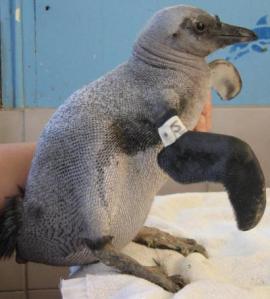
Feather-loss disorder has also been observed in African penguins, which inhabit the coast and offshore islands of South Africa. (Photo/Nola Parsons)
Penguins already endure their fair share of image problems. They’re a bit pudgy around the middle (not that there’s anything wrong with that). They have wings, but can’t fly, and a beach strut that’s really more of an awkward waddle. Now these tuxedoed birds can add bald to that list.
In a somewhat alarming twist of fate, penguins are being born featherless, and scientists don’t know why.
The phenomenon first emerged in 2006 when researchers observed featherless black-footed (AKA African) penguin chicks at a rehabilitation center in Cape Town, South Africa. That year about 59 percent of penguin chicks at the South African Foundation for the Conservation of Coastal Birds lost their feathers, followed by 97 percent in 2007. Meanwhile, researchers with the Wildlife Conservation Society and University of Washington in Argentina also observed featherless Magellanic penguins in the wild.
In both cases, the featherless chicks grew at slower rates than their downy counterparts, most likely because they had to expend more energy to regulate their body temperature, said the researchers in a press release. The goose-fleshed penguins also had a tendency to spend more time in the sun, compared to feathered penguins. Many of these vulnerable chicks died during the study.
So far, scientists don’t yet know what’s causing what looks like the avian version of mange. Disease, thyroid disorder, genetics and nutrient deficiencies could all be potential culprits, they say.
On a slightly more positive note, it does look like chicks that survive do eventually grow feathers. Researchers are working furiously to figure out what’s causing the trouble.
“We need to learn how to stop the spread of feather-loss disorder, as penguins already have problems with oil pollution and climate variation,” said P. Dee Boersma, one of the study authors in a press release. “It’s important to keep disease from being added to the list of threats they face.”
Scientific Journal:
Waterbirds
Study Authors and Affiliations:
Olivia J. Kane, Jeffrey R. Smith, and P. Dee Boersma of the Wildlife Conservation Society and the University of Washington; Nola J. Parsons and Vanessa Strauss of the South African Foundation for the Conservation of Coastal Birds; and Pablo Garcia-Borboroglu and Cecilia Villanueva of Centro Nacional Patagónico
Contact:
John Delaney, jdelaney@wcs.org, 718-220-3275, Wildlife Conservation Society


